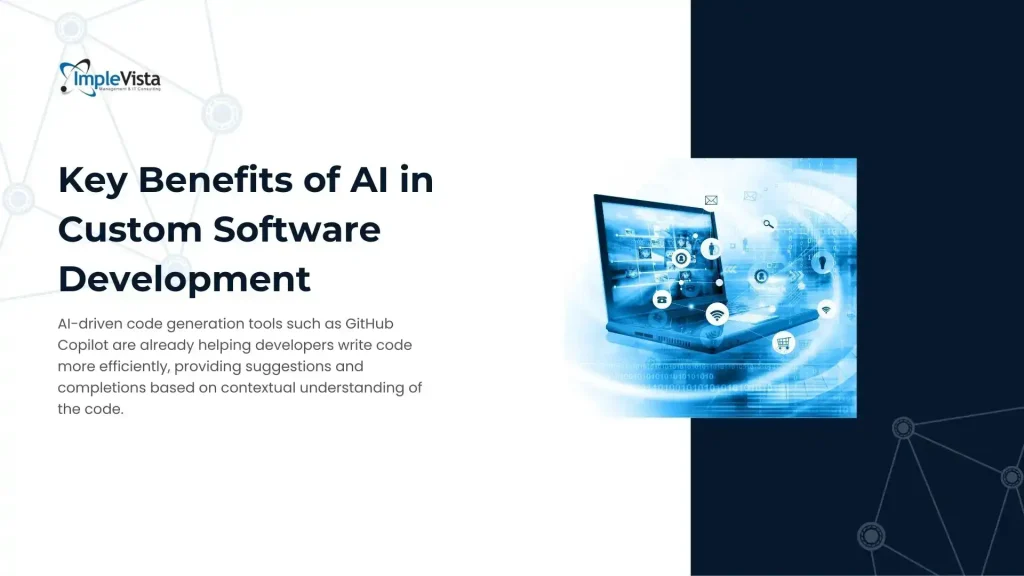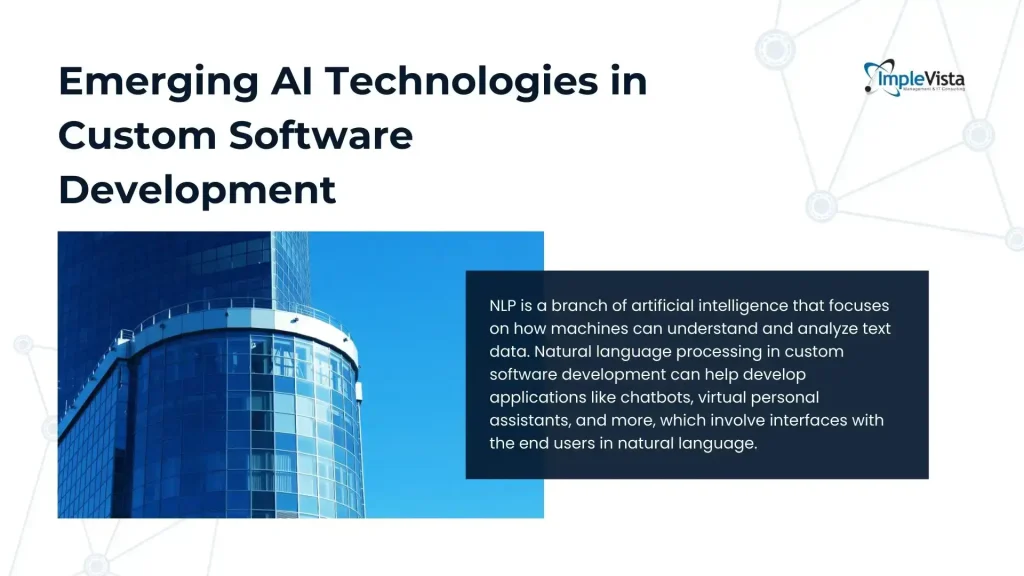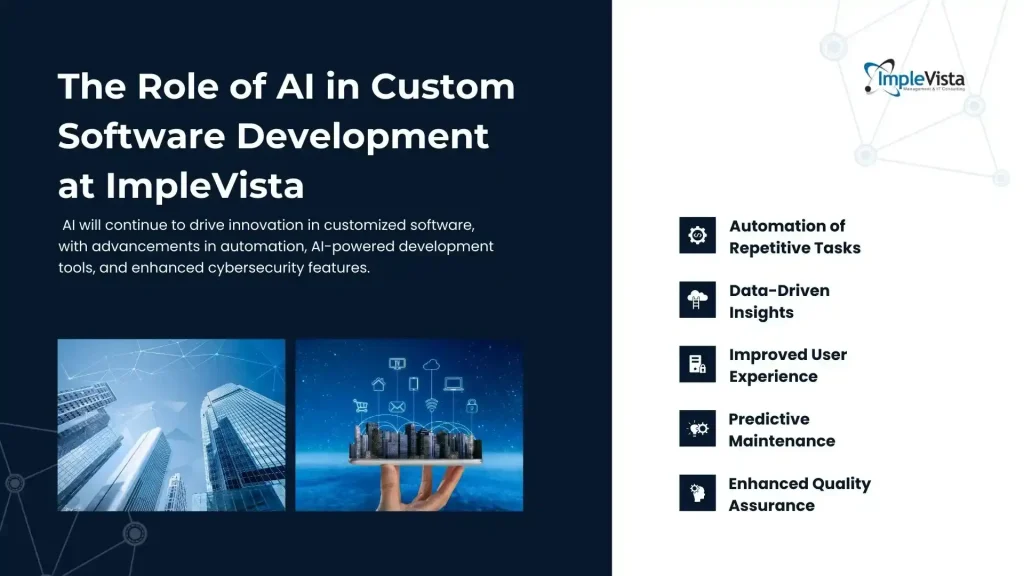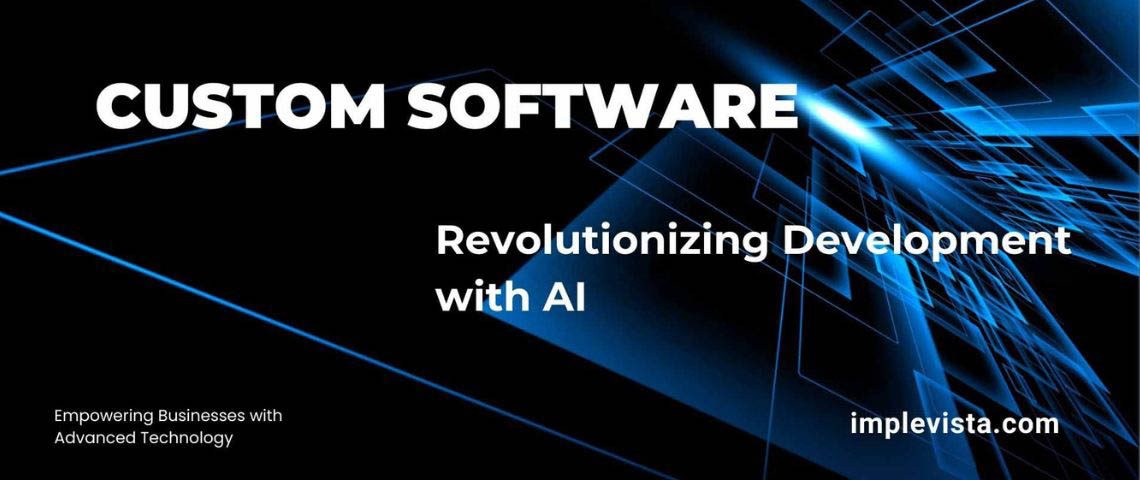In such a dynamic environment of technological advancements, artificial intelligence (AI) is transforming diversified domains, including custom software development. Adopting artificial intelligence has become one of the defining trends in modern custom software development that impacts how businesses implement it for their software solutions and how it improves the features and performance of those businesses’ software.
Summing up the information that has been given, more profound dependencies between AI and custom software development, as well as its optimization and maintenance, are expected in the future.
The Role of AI in Custom Software Development
Custom applications are the ones that are developed to fit the needs of a company or organization and not the standard business software that is available in the market. These solutions entail some level of understanding of the needs, operations, and objectives of the business in question. AI has a massive potential to positively impact the custom software development process at different stages ranging from design to optimization.
AI designers allow developers to build custom software more efficiently because many aspects can be done automatically, thereby eliminating more opportunities for mistakes. If AI is implemented smartly, developers shall be able to do more creative and intellectual jobs while leaving AI to repeat tedious coding or testing. In addition, AI can work as a tool to analyze large volumes of information to provide forecasts; this is especially applicable to the creation of programs that are suitable for the changing needs of firms.

Key Benefits of AI in Custom Software Development
- Enhanced Efficiency and Speed
In the typical software development process, coding, testing, and debugging can take a long time before achieving the desired functionality. AI can enhance these forms by automating tasks, including the generation of template code, identification of bugs, and offering suggestions for enhancements. AI-based tools can help developers by suggesting code snippets; this would minimize time investment on lower-level work and thus help reduce time to market.
For instance, AI-driven code generation tools such as GitHub Copilot are already helping developers write code more efficiently, providing suggestions and completions based on contextual understanding of the code.
- More intelligent Decision-Making with Data Analytics
AI can be advantageous to businesses in decision-making when implementing custom software solutions because it considers various data sets. Another way in which AI works is by analyzing data related to the company through specific algorithms to build new software that addresses the company’s needs.
For instance, AI can look at past interactions and user comments and design end-user-friendly applications. This approach of basing a product on data collected is way more efficient. This means that it will be easier to release a product that will meet the user’s needs, hence making the chances of having to redo something slim and making people happier at the end of the day.
3. Predictive Analytics and Maintenance
Adaptive maintenance is one of the most significant issues in custom Software Development because the application needs to be functional and up-to-date. It can also be used as a virtual computing assistant that can monitor data generated from the software and identify pre-suggestive problems. With the use of Artificial Intelligence, companies can predict bugs, low-performance issues, and application security risks.
This dramatically minimizes downtime and improves the durability of custom software applications, enabling a higher ROI for the software throughout its life span.
- Enhanced Customization and Personalization
AI algorithms, in particular, can help to create unique solutions within the framework of the software and, therefore, exceptional experiences within the context of such frameworks. With machine learning, AI is capable of identifying users’ activities, choices, and behaviours, which is beneficial to businesses since it can help to design software that meets the users’ specific demands.
For example, AI in e-commerce can suggest shopping items depending on customer behaviors, thus boosting sales and customer satisfaction.
- Better Testing of Software and Quality Control
AI is playing a very positive role in enhancing the software testing phase of custom software development. In the past, manual testing was more of a trial-and-error method and may have taken a lot of time to complete. AI can automate the testing process by running many scenarios to check for defects, performance problems, and irreconcilable differences.
Furthermore, when using AI for ongoing testing and assessment, the developers can ascertain that critical bugs have not escaped into the system and that the software is at par with the quality levels needed for deployment. They can input and model different types of users’ behaviours to test the functionality of the custom software under different situations, making the product more stable.

Emerging AI Technologies in Custom Software Development
Here are several AI technologies that define the future of customized software development now:
- Machine Learning (ML)
Artificial intelligence is a broad field of study, but a subfield like machine learning is at the core of many of these advances in customized software. Using ML algorithms, developers can create software that can learn from the data fed into it and get better with time and even the environment.
For instance, in e-commerce websites or content-sharing platforms, recommendation engines deployed are excellent examples of ML because they employ algorithms to learn from customer content and interests and deliver pertinent recommendations for improved user engagement.
- Natural Language Processing (NLP)
NLP is a branch of artificial intelligence that focuses on how machines can understand and analyze text data. Natural language processing in custom software development can help develop applications like chatbots, virtual personal assistants, and more, which involve interfaces with the end users in natural language. Through NLP, the user experience is greatly improved because it is easier for users to interact with the software naturally.
For instance, they can be employed to implement seamless chatbots for customer support in custom software, thus increasing satisfaction rates without having to involve many employees.
- Robotics Process Automation (RPA)
RPA, in other words, means the utilization of AI-anchored software to perform repetitive tasks that ordinarily engage human beings. In custom software development, RPA can be used to automate different office-related tasks like data input, data correction, or low-risk/complexity decision-making. Incorporating RPA in the development of any customized software solution yields better operation outcomes and cost reduction.
- AI-Driven DevOps
DevOps (Development and Operations) is a culture and set of practices that aim to shorten the development and IT operations of the software development life cycle. AI fits well within the DevOps domain as the technology enables the enhancement of automation, resource utilization, and feedback. Thus, AI applications help developers optimize infrastructure management and performance and speed up software deployment.
The Future of AI in Custom Software Development
Therefore, emerging technologies in the field of AI for software development will increasingly open up exciting opportunities for software solutions. In the coming years, we can expect to see the following trends:
1. Increased Automation and Low-Code Platforms
AI will become the core of low-code or no-code platforms that will help organizations develop software solutions without requiring programming skills. These environments will incorporate AI into nearly all the software development lifecycle processes to assist with coding and bring it closer to being accessible to just about anyone with little to no coding ability required.
2. AI-Powered Development Tools
AI-integrated development tools will be enhanced to provide instant solutions, error corrections, and code suggestions. These tools will not only enable developers to considerably shorten the development time but also guarantee the quality of the executable code.
3. Artificial Intelligence for Cyber Security
Due to the growing complexity of systems, security has become more critical than it ever was before. In particular, the role of AI will be critical in detecting and preventing cybersecurity risks in software solutions. When patterns are constantly analyzed, and potential irregularities are identified, AI-driven security systems can save business entities from data leaks and cyber threats.

The Role of AI in Custom Software Development at ImpleVista
At ImpleVista, AI plays a pivotal role in enhancing our custom software development services. Here’s how AI contributes to our development process:
- Automation of Repetitive Tasks: AI helps automate time-consuming tasks like code generation and testing, enabling our developers to focus on more complex and creative aspects of software design.
- Data-Driven Insights: By utilizing AI-driven analytics, we can efficiently process large datasets to build software solutions that are tailored to our clients’ unique business needs.
- Improved User Experience: AI allows us to create highly personalized and intuitive user experiences within it, enhancing client satisfaction and engagement.
- Predictive Maintenance: We use AI to anticipate potential software issues before they arise, ensuring the longevity and stability of the custom solutions we deliver.
- Enhanced Quality Assurance: AI-powered tools help automate the testing phase and identify bugs and performance issues more accurately and quickly, which results in higher-quality software.
Questions and Answers:
What is custom software development?
Custom software development involves creating software solutions tailored to the specific needs of a business, as opposed to using off-the-shelf solutions.
How does AI impact the custom software development process?
AI automates various aspects of the development process, such as code generation, bug detection, and testing, thereby improving efficiency, reducing errors, and speeding up time-to-market.
What are some examples of AI tools used in software development?
Examples include AI-powered code completion tools like GitHub Copilot, AI-driven testing platforms, and machine learning models for predictive analytics.
Can AI improve the quality of customized software?
Yes, AI can improve software quality by automating testing, identifying bugs, and providing real-time suggestions for improvements.
How does machine learning contribute to software development?
Machine learning helps software adapt over time by learning from data and continuously improving its performance and user experience.
What role does natural language processing (NLP) play in software development?
NLP enables software to understand and interpret human language, making it ideal for chatbots, virtual assistants, and other user-friendly applications.
What are low-code platforms, and how do they use AI?
Low-code platforms allow users to build software applications with minimal coding. AI is used to automate many aspects of development, making it easier to create custom solutions.
How can AI assist in the maintenance of customized software?
AI can predict potential issues and perform predictive maintenance, identifying problems before they occur and minimizing downtime.
What is robotic process automation (RPA)?
RPA involves using AI-driven software robots to automate repetitive tasks, such as data entry or simple decision-making processes.
What is the future of AI in customized software development?
AI will continue to drive innovation in customized software, with advancements in automation, AI-powered development tools, and enhanced cybersecurity features.
The future of AI in software development is auspicious. About repetitive tasks, the application of data in the decision-making process, and the delivery of intelligent and customized user interfaces, artificial intelligence is revolutionizing the management of custom software development and support.
Companies that use AI technologies will be able to develop better, faster, and more secure software solutions, which will help them to succeed in the modern world where competition is high.




